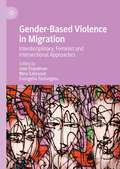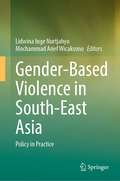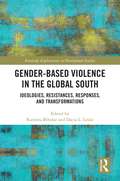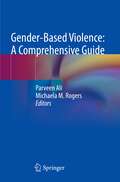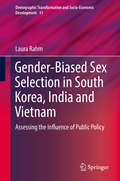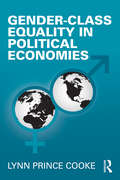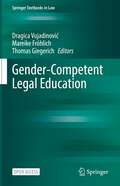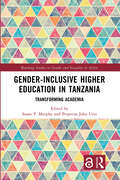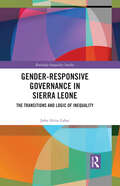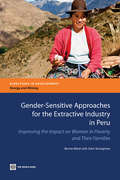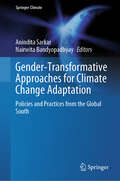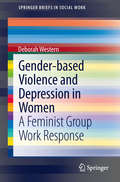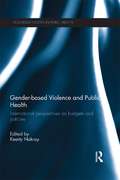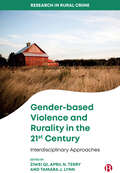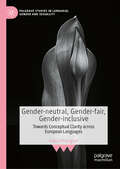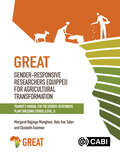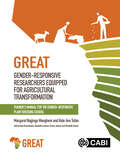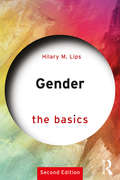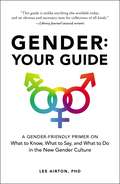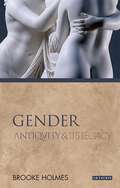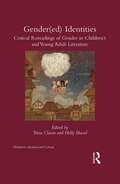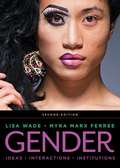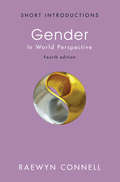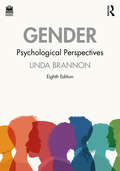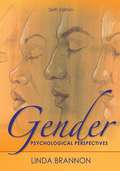- Table View
- List View
Gender-Based Violence in Migration: Interdisciplinary, Feminist and Intersectional Approaches
by Jane Freedman Nina Sahraoui Evangelia TastsoglouWith contributions from a diverse array of international scholars, this edited volume offers a renewed understanding of gender-based violence (GBV) by examining its social and political dimensions in migration contexts. This book engages micro, meso, and macro levels of analysis by foregrounding a conceptualization of GBV that addresses both its interpersonal and structural causes. Chapters explore how GBV frameworks and migration management intersect, bringing to the forefront the specific inequalities these intersections produce for migrant women. Drawing upon several disciplines, the authors engage in co-writing a critical engagement which proposes an original understanding of how the concepts of intersectionality, vulnerability and precarity speak to each other from a feminist perspective. This volume will be of interest to scholars/researchers and policymakers in Gender Studies, Migration and Refugee Studies, Sociology, Political Science, Trauma Studies, Human Rights and Socio-Legal Studies.
Gender-Based Violence in South-East Asia: Policy in Practice
by Lidwina Inge Nurtjahyo Mochammad Arief WicaksonoThis book presents new research on gender-based violence in Southeast Asia, bringing together varied scholarly work in law, policy, and practice. It enables a greater understanding of violence against women as an international concern, highlighting particular issues that arise in the region. Against a background of international obligations to ensure women's rights through laws and policies that are geared at ending violence against women and girls, this research documents the state failures, individual shame and fear, and societal culture that collectively affects the reporting, investigation, prosecution of perpetrators, and protection of victims. The research explores differing legal mechanisms both internationally, and within nation states, relating to cases of physical and sexual violence. It recognizes the need for functioning mechanisms to ensure women can report their cases safely and be provided with protective and therapeutic services in a way that is systematic, effective, and measurable. Laws and court decisions are analyzed, crisis and safety centers are examined, and in-depth interviews are conducted with actors and NGOs with relevant roles and functions in the mechanism of cases of violence against women. The result is a comprehensive assessment of the incalculable harm it does within Southeast Asian society, and the obstacles it presents for law enforcement. The chapters uncover mechanisms with unique characteristics across Southeast Asia, providing a nuanced understanding of the cultural and social backgrounds, as well as the religious structures, that can both help and hinder suitable frameworks. It is relevant to scholars, policymakers, and practitioners in law, criminology, and gender sociology.“This is a valuable contribution towards empowering the women of South East Asia out of victimhood to valued equality, involvement in governance and leadership through the elimination of violence and discrimination and an excellent resource not just for those working in this field but for those involved in law making, the media and the people of South East Asia.”- Professor Felicity Gerry QC, Barrister at Crockett Chambers Melbourne and Libertas Chambers, London, and Professor of Legal Practice at Deakin University and Honorary Professor at Salford University.
Gender-Based Violence in the Global South: Ideologies, Resistances, Responses, and Transformations (Routledge Explorations in Development Studies)
by Dacia L. LeslieThis book amplifies the different voices and experiences of those facing gender-based violence (GBV) in the Global South. It explores the localised ways in which marginalised individuals design modes of coping with and address GBV, including cultural interpretations, and artistic and faith-based expressions.The book examines GBV triggers, prevalence, and societal impacts while referring to community, national, and regional mobilisation to deal with the phenomenon in its various manifestations, including physical, psychological, political, domestic, and public violence. It explores issues related to women’s negotiations with the patriarchal underpinnings of GBV; the role of the law and history in the perpetuation of GBV; the complementary role of culture and faith to legal protection against GBV, and access to justice for women and girls. In doing so, the book exposes understandings and expressions of GBV, as well as methodologies and indigenous initiatives to prevent it through local viable solutions. The book thus challenges the normalisation of GBV in the Global South.Providing concrete and culturally relevant suggestions for challenging ingrained models of gender understandings of violence in the Global South, this book will be of interest to academics in the fields of Development Studies, Gender Studies, Women’s Studies, Violence and Abuse Studies, Human Rights, Criminal Law, and Socio-Legal Studies.
Gender-Based Violence: A Comprehensive Guide
by Parveen Ali Michaela M. RogersThis book provides comprehensive information about various types of gender-based violence (GBV) and abuse. GBV is a major public health and social problem that affects people, mostly women and girls, in every community, culture, and country. GBV refers to the violence or a pattern of abusive behaviours including physical aggression, sexual coercion, psychological abuse and controlling behaviours resulting in physical, sexual or psychological harm. It is associated with severe physical and psychological consequences, and can result in death. . GBV can take many forms including female foeticide, infanticide, female genital mutilation, child marriage, grooming, trafficking, forced marriage, dowry- related abuse, honour-based violence, rape, sexual assault, stalking, harassment, street violence, abuse against older people, domestic violence, and intimate partner violence. It can take place in public, private and virtual settings, and within the context of intimate, familial, community and institutional relationships. While all these forms affect girls and women more, boys and men can also be exposed of various forms of violence including child abuse, sexual abuse, wartime violence, corporal punishment to name a few. This book takes a unique approach and presents an overview of gender-based violence and related practices throughout the world. The book is written in a user friendly manner in order to be accessible as an introductory text to a wide range of readers including students, practitioners and researchers. Edited by a public health academic and a social worker, with contributions representing a wide range of disciplines, the book will appeal to many professions including nurses, midwives, social care and social work practitioners, police, teachers, psychologists, and sociologists.
Gender-Biased Sex Selection in South Korea, India and Vietnam: Assessing the Influence of Public Policy (Demographic Transformation and Socio-Economic Development #11)
by Laura RahmThis book provides an in-depth analysis of the influence of public policy on sex selection. Three Asian countries were chosen for the comparative policy analysis, namely South Korea, India and Vietnam that share in common a historical legacy of son preference, high levels of sex imbalances and active policy response to curbing the growing demographic masculinization of their nations. The research based on the data collected from field work in the three countries shows that despite the adoption of very similar anti-sex selection policies the outcomes have been markedly different for each of the three countries. These unexpected diverse outcomes are explained partly by their different historical and cultural contexts, and partly to the different social, political and economic institutions and dynamics. This monograph offers careful and detailed explanations of both within and across country diversities in policy outcomes, pointing to the importance and the limits of cross-national policy learning and adoption, and raising questions about the efficacy of international organizations’ current approaches to global policy and knowledge transfer.
Gender-Class Equality in Political Economies (Perspectives on Gender)
by Lynn Prince CookeGender-Class Equality in Political Economies offers an in-depth analysis of gender-class equality across six countries to reveal why gender-class equality in paid and unpaid work remains elusive, and what more policy might do to achieve better social and economic outcomes. This book is the first to meld cross-time with cross-country comparisons, link macro structures to micro behavior, and connect class with gender dynamics to yield fresh insights into where we are on the road to gender equality, why it varies across industrialized countries, and the barriers to further progress.
Gender-Competent Legal Education (Springer Textbooks in Law)
by Thomas Giegerich Dragica Vujadinović Mareike FröhlichMale-dominated law and legal knowledge essentially characterized the whole of pre-modern history in that the patriarchy represented the axis of social relations in both the private and public spheres. Indeed, modern and even contemporary law still have embedded elements of patriarchal heritage, even in the secular modern legal systems of Western developed countries, either within the content of legislation or in terms of its implementation and interpretation. This is true to a greater or lesser extent across legal systems, although the secular modern legal systems of the Western developed countries have made great advances in terms of gender equality. The traditional understanding of law has always been self-evidently dominated by men, but modern law and its understanding have also been more or less “malestreamed.” Therefore, it has become necessary to overcome the given “maskulinity” of legal thought. In contemporary legal and political orders, gender mainstreaming of law has been of the utmost importance for overcoming deeply and persistently embedded power relations and gender-based, unequal social relations. At the same time and equally importantly, the gender mainstreaming of legal education – to which this book aims to contribute – can help to gradually eliminate this male dominance and accompanying power relations from legal education and higher education as a whole. This open access textbook provides an overview of gender issues in all areas of law, including sociological, historical and methodological issues. Written for students and teachers around the globe, it is intended to provide both a general overview and in-depth knowledge in the individual areas of law. Relevant court decisions and case studies are supplied throughout the book.
Gender-Inclusive Higher Education in Tanzania: Transforming Academia (Routledge Studies on Gender and Sexuality in Africa)
by Susan P. Murphy Perpetua John UrioWhilst there is an extensive body of research exploring the barriers to gender equality and female empowerment in high-income states, there are far fewer systematic analyses within lower-income settings. This book draws on extensive empirical data to analyse gender mainstreaming and gender transformative actions in Tanzanian higher education.The book maps the practical landscape of gender mainstreaming across 14 universities in Tanzania, and the theoretical landscape of African theories of masculinities and femininities underpinning educational institutions and practices. It then assesses the Gender Awareness and Transformation through Education project, which was designed to support the development of gender expertise and capacities in research and education at one specific institution, across both its administrative and academic units. Current and future academics at Dar es Salaam University College of Education were trained in gender-based research and education, and a strategic plan was developed to guide in the establishment of a Gender Research Centre that will provide gender expertise in research and teaching to the College; and, over time, to other HEIs nationally and regionally. By bringing together real-world insights from action-based research, the book demonstrates the impact of real-time social change and gender transformation, with implications both for Tanzania and beyond.Bringing novel empirical insights and policy recommendations, this book will be of interest to researchers and policy makers across the fields of gender studies, education, and African studies.
Gender-Responsive Governance in Sierra Leone: The Transitions and Logic of Inequality (Routledge Inequality Studies)
by John Idriss LahaiThis book investigates gender equality and women’s empowerment in Sierra Leone, focusing in particular on women’s interactions with the state and its development partners. In particular, it highlights women’s increasing agency in acquiring knowledge, diffusing power, engaging in grassroots politics, and compelling the government to adopt more gender-responsive policies. Drawing on extensive fieldwork and original multidisciplinary research methods (including econometric and statistical models), the book first sets out the history and impact of inequality in Sierra Leone. It then goes on to shed light on the constructive and collaborative engagement of women and the state on a variety of local and external strategies for promoting gender equality. Drawing throughout on insights from across gender studies, sociology, anthropology, economics, and political science, the book highlights how women are succeeding in transforming marginality into agency in order to build a platform for influencing change. By qualifying and quantifying the challenges of gender inequality in Sierra Leone, and the progress that is being made, this book provides important insights that will be relevant to other fragile, post-conflict states within Africa. The book will be of interest to students and researchers studying women and gender studies, African studies, economics, international development, sociology, and political science and international relations. The book will also deepen policymakers’ and practitioners’ understanding of women’s diverse trajectories and experiences, and how the typology of government affects the patterns of inequality and equality.
Gender-Sensitive Approaches for the Extractive Industry in Peru
by John Strongman Bernie WardLarge amounts of 'development assistance' in the form of infrastructure and social programs are annually made available to communities across Peru due the presence of extractive industry companies. These investments however do not always achieve the social development impact anticipated. As one company pointed out: "our company has invested millions of dollars in social programs in our neighboring communities, however the indicators for child malnutrition and maternal health have seen no noticeable improvement". Communities base their support or rejection for extractive industry operations by weighing up the benefits against the risks; where the risk-benefit balance sheet does not look positive, conflict is likely. Companies, and the governments who benefit from their tax revenues, therefore work hard to reduce risks and increase benefits for communities: but this report confirms an overlooked aspect of the development outcomes: men are capturing more of the benefits and these are not necessarily reaching the wider family; whereas it is the women and children who experience more of the risks that arise from the presence of extractive industry projects. The impact on women could be significantly improved by taking simple steps with little additional effort or cost - disaggregating data by sex, strengthening consultations with women, investigating issues of risk to women, improving women's access to benefits. Additionally this report challenges the "development industry" (those non-governmental organizations, community-based organizations, universities, research centers, think tanks, funders, foundations and training organizations for whom the development of theories and practices to alleviate poverty is a primary objective.) to work more closely with local government and companies, sharing its knowledge on thematic issues such as gender (and other areas such as Rights-Based Approaches or Community-Driven Development) and on programs (such as maternal health, bi-lingual education, or productive chain development) to achieve what the NGOs, civil society and local government have within their mandates to deliver, and what the EI sector seeks.
Gender-Transformative Approaches for Climate Change Adaptation: Policies and Practices from the Global South (Springer Climate)
by Anindita Sarkar Nairwita BandyopadhyayThis book offers an array of narratives and recommendations for gender-transformative climate change adaptation strategies based on research and evidence from the Global South. We look at gender-transformative adaptation (GTA) as a process that aims to address gender and power imbalance and strive for a change at the institutional level to enable empowering consequences through the meaningful and equal participation of women and men in leadership, policy, and decision-making processes. It makes four main contributions. First, it collates scholarship on the politics of adaptation and how policies affect men and women differently in communities and different geographical locations. Second, it captures pathways for parallel goals of `climate action' (SDG 13) and `achieving gender equality and empowerment' (SDG 5) through transformative ideas. Third, it curates new methodologies and adds knowledge to the gender transformative research (GTR) and assesses its potential for challenging and addressing gender power equations. Fourth, it voices the parallel ideas and evidence, placing women as both &“victims of climate change&” and as the &“new change makers&” in the path of climate adaptation.
Gender-based Violence and Depression in Women
by Deborah WesternSocial workers, in whatever capacity they work, can expect to come into contact with women who have experienced/are experiencing violence and with women who are experiencing depression. Therefore, a range of social work supports and interventions are required in order to meet the needs of diverse women and assist them in their recovery. One of these methods is group work where women can share their experiences, learn from each other, reflect on their learnings and identify and achieve changes in their circumstances. This book is based on original research by the author that sought to understand depression in women from a feminist and gender-informed perspective, develop a feminist-based group work response, and highlight the activities of consciousness-raising and resistance as methods for women to achieve change in their lives and in their selves. An innovative and creative group work program, the Women's Journaling Group Program, was developed from this research and provides a new method of working with women who have experienced/are experiencing violence and mild-moderate depression. The Women's Journaling Group Program is research-informed, theoretically-grounded, practice-based and feminist and gender-focused. This book, and the program model within it, is an important contribution to the field of critical feminist social work practice.
Gender-based Violence and Public Health: International perspectives on budgets and policies
by Keerty NakrayGender-based violence is a multi-faceted public health problem with numerous consequences for an individual’s physical and mental health and wellbeing. This collection develops a comprehensive public health approach for working with gender-based violence, paying specific attention to international budgets, policies and practice and drawing on a wide selection of empirical studies. Divided into two parts, the text looks at how public health budgets and policies can be used to influence a range of risk factors and outcomes, and then outlines a theoretical and conceptual framework. The second section draws on empirical studies to illustrate ways of managing the risks and impacts of, and responses to, the problem. It concludes by summarising those risk factors that can be effectively addressed through appropriately budgeted public health programmes globally. Highlighting ways of bolstering protective and resilience factors and identifying early interventions, it demonstrates the importance of inter-agency interventions through coordinated effort from a wide range of sectors including social services, education, religious organisations, judiciary, police, media and business. This inter-disciplinary volume will interest students and researchers working on gender-based violence, gender budgeting and public health policy from a range of backgrounds, including public health, sociology, social work, public policy, gender studies, development studies and economics.
Gender-based Violence and Rurality in the 21st Century: Interdisciplinary Approaches
by Ziwei Qi, April N. Terry, Tamara J. Lynn and Walter S. DeKeseredyGender-based violence (GBV) can take many forms and have detrimental effects across generations and cultures. The triangulation of GBV, rurality and rural culture is a challenging and essential topic and this edited collection provides an innovative analysis of GBV in rural communities. Focusing on under-studied and/or oppressed groups such as immigrants and LGBTQIA+ people, the book explores new theories on patterns of violence. Giving insights into GBV education and prevention, the text introduces community justice and victim advocacy approaches to tackling issues of GBV in rural areas. From policy review into actionable change, the editors examine best practices to positively affect the lives of survivors.
Gender-neutral, Gender-fair, Gender-inclusive: Towards Conceptual Clarity across European Languages (Palgrave Studies in Language, Gender and Sexuality)
by Falco PfalzgrafThis edited book explores the ambiguity and overlap in the usage of terms such as &“gender-inclusive&”, &“gender-fair&”, and &“gender-neutral&” across various disciplines and languages, aiming to achieve conceptual clarity and advocate for standardisation. The authors examine different aspects of gender-inclusivity in European languages including Dutch, English, French, German, Italian, Polish, Romanian, Spanish, and Swedish. This book will be of interest to students and scholars of fields such as Linguistics, Psychology, Anthropology, and Cultural Studies.
Gender-responsive Researchers Equipped for Agricultural Transformation, Level 2.: Trainer’s Manual for the Gender-Responsive Plant Breeding Course
by Dr Margaret Najjingo Mangheni Professor Hale Ann Tufan Dr Elizabeth AsiimweThis manual presents the training process for the Gender-Responsive Plant Breeding course, implemented by Makerere and Cornell Universities, over a period of five years (2016-2020), under the Gender-Responsive Researchers Equipped for Agricultural Transformation (GREAT) project funded by the Bill and Melinda Gates Foundation. It has five broad parts: I) Introduction; II) Required preparation before the course; III) Phase one (9-day, face-to-face training); IV) the 5-month Field Training phase; and V) Phase two (5-day, face-to-face training). Each session consists of specific learning objectives, session plans and slides, delivery methods, practical exercises and examples, as well as relevant tips and synthesized take-home messages. The sessions were developed by an international multidisciplinary team of experts in gender and agriculture and subjected to a rigorous peer review and quality assurance process. GREAT aims to contribute to building a pool of gender-responsive agricultural researchers able to advance more equitable and effective agricultural systems in Africa and beyond. This manual is for all facilitators/trainers interested in applied, gender responsive agricultural research.
Gender-responsive Researchers Equipped for Agricultural Transformation: Trainer’s Manual for the Gender-Responsive Plant Breeding Course
by Dr Margaret Najjingo Mangheni Professor Hale Ann TufanThis manual presents the training process for the Gender-Responsive Plant Breeding course, implemented by Makerere and Cornell Universities, over a period of five years (2016-2020), under the Gender-Responsive Researchers Equipped for Agricultural Transformation (GREAT) project funded by the Bill and Melinda Gates Foundation. It has five broad parts: I) Introduction; II) Required preparation before the course; III) Phase one (9-day, face-to-face training); IV) the 5-month Field Training phase; and V) Phase two (5-day, face-to-face training). Each session consists of specific learning objectives, session plans and slides, delivery methods, practical exercises and examples, as well as relevant tips and synthesized take-home messages. The sessions were developed by an international multidisciplinary team of experts in gender and agriculture and subjected to a rigorous peer review and quality assurance process. GREAT aims to contribute to building a pool of gender-responsive agricultural researchers able to advance more equitable and effective agricultural systems in Africa and beyond. This manual is for all facilitators/trainers interested in applied, gender responsive agricultural research.
Gender: 2nd edition (The Basics)
by Hilary M. LipsGender: The Basics is an engaging introduction to the influence of cultural, historical, biological, psychological, and economic forces on ways in which we have come to define and experience femininity and masculinity, and on the impact and importance of gender categories. Highlighting that there is far more to gender than biological sex, it examines theories and research about how and why gender categories and identities are developed and about how interpersonal and societal power relationships are gendered. It takes a global and intersectional perspective to examine the interaction between gender and a wide range of topics including: Relationships, intimacy, and concepts of sexuality across the lifespan The workplace and labour markets Gender related violence and war Public health, poverty, and development Gender and public leadership This new edition includes increased coverage of trans visibility and activism, LGBTQ studies and critical masculinity studies, global developments in women’s political leadership, links between gender and economic wellbeing, and cyberbullying. Supporting theory with examples and case studies from a variety of contexts, suggestions for further reading, and a detailed glossary, this text is an essential read for anyone approaching the study of gender for the first time.
Gender: A Gender-Friendly Primer on What to Know, What to Say, and What to Do in the New Gender Culture
by Lee AirtonAn authentic and accessible guide to understanding—and engaging in—today’s gender conversation.The days of two genders—male, female; boy, girl; blue, pink—are over, if they ever existed at all. Gender is now a global conversation, and one that is constantly evolving. More people than ever before are openly living their lives as transgender men or women, and many transgender people are coming out as neither men or women, instead living outside of the binary. Gender is changing, and this change is gaining momentum. We all want to do and say the right things in relation to gender diversity—whether at a job interview, at parent/teacher night, and around the table at family dinners. But where do we begin? From the differences among gender identity, gender expression, and sex, to the use of gender-neutral pronouns like singular they/them, to thinking about your own participation in gender, Gender: Your Guide serves as a complete primer to all things gender. Guided by professor and gender diversity advocate Lee Airton, PhD, you will learn how gender works in everyday life, how to use accurate terminology to refer to transgender, non-binary, and/or gender non-conforming individuals, and how to ask when you aren’t sure what to do or say. It provides you with the information you need to talk confidently and compassionately about gender diversity, whether simply having a conversation or going to bat as an advocate. Just like gender itself, being gender-friendly is a process for all of us. As revolutionary a resource as Our Bodies, Ourselves, Gender: Your Guide invites everyone on board to make gender more flexible and less constricting: a source of more joy, and less harm, for everyone. Let’s get started.
Gender: Antiquity And Its Legacy (Ancients And Moderns Ser.)
by Brooke HolmesGender has now become a pervasive topic in the humanities and social sciences. Yet despite its familiarity within universities and colleges, some have argued that the radical debates which first characterized gender studies have become ghettoized or marginalized -- so that gender no longer makes the impact on creative thinking and ideas that it once did. Brooke Holmes here rescues ancient ideas about sex and gender in order precisely to reinvigorate contemporary debate. She argues that much writing on gender in the classical age fails to place those ancient ideas within their proper historical contexts. As a result, the full transformational force of that thinking is often overlooked. In this short, lively book, the author offers a sophisticated and historically rounded reading of gender in antiquity in order to map out the future of contemporary gender studies. By re-examining ancient notions of sexual difference, bodies, culture, and identity, Holmes shows that Plato, Aristotle, the Stoics, Epicureans and others force us to reassess what is at stake in present-day discussions about gender. The ancient world thus offers a vital resource for modern gender theory.
Gender: Critical Rereadings of Gender in Children's and Young Adult Literature (Children's Literature and Culture)
by Tricia Clasen and & Holly HasselThis volume brings together diverse, cross-disciplinary scholarly voices to examine gender construction in children's and young adult literature. It complements and updates the scholarship in the field by creating a rich, cohesive examination of core questions around gender and sexuality in classic and contemporary texts. By providing an expansive treatment of gender and sexuality across genres, eras, and national literature, the collection explores how readers encounter unorthodox as well as traditional notions of gender. It begins with essays exploring how children's and YA literature construct communities formed by gender, ethnicity, sexuality, and in face-to-face and virtual spaces. Section II's central focus is how gendered identities are formed, unpacking how texts for young readers ranging from Amish youth periodicals to the blockbuster Divergent series trace, reproduce, and shape gendered identity socialization. In section III, the essential literary function of translating trauma into narrative is addressed in classics like Anne of Green Gables and Pollyanna, as well as more recent works. Section IV's focus on sexuality and romance encompasses fiction and nonfiction works, examining how children's and young adult literature can serve as a regressive, progressive, and transgressive site for construction meaning about sex and romance. Last, Section IV offers new readings of paratextual features in literature for children -- from the classic tale of Cinderella to contemporary illustrated novels. The key achievement of this volume is providing an updated range of multidisciplinary and methodologically diverse analyses of critically and commercially successful texts, contributing to the scholarship on children's and YA literature; gender, sexuality, and women's studies; and a range of other disciplines.
Gender: Ideas, Interactions, Institutions
by Myra Marx Ferree Lisa WadeWade and Ferree's "Gender" is a sophisticated yet accessible introduction to sociological perspectives on gender. Drawing on memorable examples mined from history, pop culture, and current events, "Gender" deftly moves between theoretical concepts and applications to everyday life. New discussions of #metoo, toxic masculinity, and gender politics in the Trump era help students participate in today's conversation about gender. -- From product description.
Gender: In World Perspective (Short Introductions #13)
by Raewyn W. ConnellHow can we understand gender in the contemporary world? What psychological differences now exist between women and men? How are masculinities and femininities made? And how is gender entwined in global politics and debates over trans issues? Raewyn Connell – one of the world's leading scholars in the field – answers these questions and more. Her book provides a sophisticated yet accessible introduction to modern gender studies, covering empirical research from all parts of the world, in addition to theory and politics. As well as introducing the field, Gender provides a powerful contemporary framework for gender analysis with a strong and distinctive global awareness. Highlighting the multidimensional character of gender relations, Connell shows how to link personal life with large-scale organizational structures, and how gender politics changes its form in changing situations. The fourth edition of this influential book brings the statistical picture of gender inequalities up to date, and offers new close-focus case studies of gender research. Like previous editions, it examines gender politics and global power relations, but with added discussion around contemporary issues of intersectionality, populism, gender-based violence, trans struggles and environmental change. It also speaks at the intimate level, about embodied gender and personal relationships. Gender moves from personal experience to global problems, offering a unique perspective on gender issues today.
Gender: Psychological Perspectives
by Linda BrannonThis fully updated and revised eighth edition examines the behavioral, biological, and social context in which people express gendered behaviors, utilizing the latest research to help students think critically about research findings and stereotypes and provoking them to examine and revise their own preconceptions.The text’s unique pedagogical program helps students understand the portrayal of gender in the media and the application of gender research in the real world. Headlines from the news open each chapter; Gendered Voices present true personal accounts of people’s lives; According to the Media boxes highlight gender-related coverage in newspapers, magazines, books, TV, and movies; while According to the Research boxes offer the latest scientifically based research to help students analyze the accuracy and fairness of gender images presented in the media. Additionally, Considering Diversity sections emphasize the cross-cultural perspective of gender.Key features of the new edition include Expanded discussion of transgender and non-binary identities 12 new headline articles including topics ranging from the myth of biological sex to the wars over sex education and the factors involved in the gender pay gap Comprehensive digital resources with content for instructors and students. Intended for undergraduate or graduate courses on the psychology of gender, psychology of sex, gender issues, women in society, and women’s or men’s studies, this book is also applicable to sociology and anthropology courses on diversity.
Gender: Psychological Perspectives (6th Edition)
by Linda BrannonThis book examines the topic of gender--the behaviors and attitudes that relate to (but are not entirely congruent with) biological sex.
